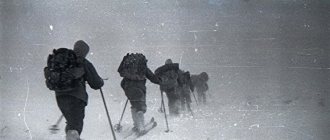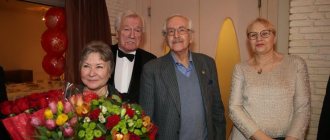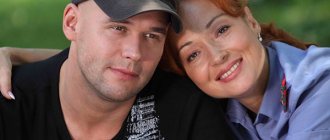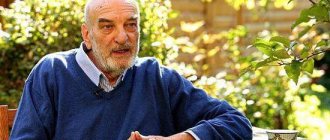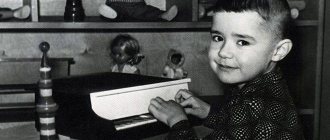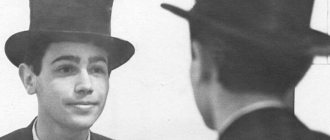Biography
Actor and rock musician Pyotr Nikolaevich Mamonov was born into a family of Moscow intellectuals on Bolshoi Karetny.
My father was an engineer, my mother was a translator of Scandinavian languages. “I grew up on Bolshoy Karetny, and in the early 1960s it was customary for us to go out into the yard in the evening, guys about 20 years old, stand, smoke, and talk for two hours. And, probably, Vysotsky stood there, too; he lived there in those years,” recalls Pyotr Nikolaevich.
Mamonov’s phenomenal artistry manifested itself in childhood. True, not everyone saw him as a creative person; rather, on the contrary, they considered him a rebel and a hooligan. He was even expelled from schools twice for “staging a circus.”
He was among the first Moscow hippies. In the mid-1960s, he formed his first musical group, Express, and performed at school parties. From a young age he wrote poetry and staged performances. In addition, he danced twist and rock 'n' roll very well.
In 1979, Peter graduated from the Moscow Printing College. Then, in 1979-1982, he studied at the editorial department of the Moscow Printing Institute. He is fluent in English and Norwegian; his translations have been published in many poetry anthologies. He worked as a printer at the Krasny Proletary printing house.
"Sounds of Mu"
Around 1980, Pyotr Mamonov began writing songs, and in 1983, together with his friend Alexander Lipnitsky, he created his own musical group. It was the famous rock band “Sounds of Mu”. Mamonov himself doesn’t know exactly how such a name came up: “I just blurted it out somehow.”
At first, the group performed only at apartment concerts. The musicians met other performers who later became iconic Russian rock bands. “Bravo”, “Aquarium”, “Kino” and others played and sang on the same “wavelength”. These “solo albums” grew in popularity and began to generate income for the performers. “Sounds of Mu” with their extravagant vocalist Pyotr Mamonov quickly gained fame among a certain category of listeners.
The group's first performance in front of a large audience took place in 1984. Pyotr Mamonov and his band gave a concert in the large assembly hall of one of the Moscow special schools. A considerable number of representatives of the capital's underground came to the concert.
Mamonov’s close friend Artem Troitsky later wrote that the musician represented himself in his performances, but in a highly exaggerated form. The result was an “explosive mixture” of “a street jester, a gallant scumbag and an obliviously bitter drunkard.”
The turning point was the performance of “Sounds of Mu” at the Moscow Rock Laboratory festival in June 1988, when backstage at the Gorbunov Palace of Culture, their old acquaintance Vasily Shumov approached the musicians and offered to produce their first album, as well as provide all the necessary equipment for this. Being an experienced sound engineer, Shumov established strict discipline at the studio and forced the group to record in just 20 days. The debut album was called “Simple Things” and was released in a small edition on two gramophone records.
At the same time, an album called “Zvuki Mu” was released in London. Its publisher was English producer Brian Eno. The group was “covered” by a wave of success. The musicians went on a big tour of European countries and toured the USA twice. It was a huge success. Returning to the USSR, the group recorded the album “Transreliability”, without demonstrating the same quality. The team broke up, but an independent musical biography of Pyotr Mamonov began. In 1995, the musician left for the village and there created one of the most difficult albums to perceive, entitled “The Life of Amphibians as It Is.”
Musical creativity
In the works of Pyotr Mamonov, poetry and music are inseparable. The artist has always been interested in poetry, and since 1980 he began writing songs. In 1983 he created the extravagant rock band “Sounds of Mu”. Where the name of the group came from, Pyotr Mamonov finds it difficult to answer: “I just blurted it out somehow.”
The debut album “Zvuki Mu” was released by English producer Brian Eno in 1988 in London. At the same time, the band went on a European tour, as well as two tours in the United States, where the musicians enjoyed success. Upon returning to the USSR, “Zvuki Mu” recorded the album “Transreliability” and dispersed. In total, about 20 records were released in Russia.
Peter Mamonov. An actor with a deep inner world
Since 1991, Pyotr Mamonov began performing solo. For four years he worked on the project “Mamonov and Alexey” together with his younger brother, Alexey Bortnichuk. Colleagues released an album of the same name. In 1994, Pyotr Mamonov invited drummer Yuri “Hank” Kistenev and bassist Evgeny Kazantsev to “Zvuki Mu”. Together they recorded the album “Rough Sunset.” In 1995, in the village, Mamonov completed work on an album that musically became one of the most complex - “The Life of Amphibians as It Is.” But it is not performed on stage, since the group had disbanded by that time.
Theater
In 1992, Mamonov staged musical show performances and performed on the stage of the Drama Theater named after K.S. Stanislavsky. Among his works: “The Bald Brunette” (1991), “Nobody Writes to the Colonel” (1995), “Is There Life on Mars?” (1997).
The performances took part in international festivals in Europe and America. On November 27, 2003, Pyotr Mamonov played the play “Chocolate Pushkin” for the last time at the “Club on Brestskaya” as part of the “Russian Style” program, presenting creative evenings of masters of Russian art.
And already in March 2004, the premiere of “Mouse, Boy Kai and the Snow Queen” took place. Then there was the performance “Ballet”, created by Mamonov, the Creative Association “SVOI” and the art group “Blind”.
At the end of 2012, Mamonov, after a long break, returned to the theater stage with a new one-man show, “Grandfather Peter and the Hares.”
Movies
In the early 1990s, Pyotr Mamonov pleased fans with his appearance in a new incarnation. He started staging plays. On the stage of the Konstantin Stanislavsky Theater, the audience saw his productions “The Bald Brunette”, “Is There Life on Mars”, “Nobody Writes to the Colonel”. These performances were also presented at international festivals in the USA and Europe.
Pyotr Mamonov in the film “Needle”
In 2003, Pyotr Mamonov presented fans with another work - the play “Chocolate Pushkin”. A year later, “Mice, Boy Kai and the Snow Queen” and “Ballet” were staged.
The artist made his own contribution to the art of cinema. A cinematic biography of Pyotr Mamonov consists of several paintings. The first, “Needle,” was released in 1988. Here the actor got a supporting role. And 2 years later, the film “Taxi Blues” was released about the fate of a taxi driver and a drunken musician. The last one was played by Mamonov. The film received considerable popularity and the Palme d'Or prize at Cannes.
Films that were released a little later, such as “Anna Karamazoff”, “Legs”, “Terra Incognita”, “The Time of Sorrow Has Not Come” did not receive great success, but were noticed by fans of the work of Pyotr Mamonov.
Pyotr Mamonov in the film “The Island”
In 2005, viewers saw a new project called “Dust” by Sergei Loban. Here Pyotr Mamonov doesn’t look much like his former self. The film is imbued with deep philosophical meaning. It was shot on a digital camera with virtually no budget.
They started talking about Mamonov again in 2006, when the film “The Island” was released. The actor played Elder Anatoly, who atones for a terrible sin. At the time the film was being filmed, Pyotr Mamonov turned into a hermit. The musician retired from civilization, settling in the village of Efanovo in the Moscow region. Peter’s search for the meaning of life led him to this way of life. As the musician admitted: “The highs didn’t help, I got drunk and stoned, but the emptiness remained.”
To star in “The Island,” Mamonov asked permission from his spiritual father. I started work only after the blessing. This low-budget film grossed more than $2 million at the box office. The film's ratings turned out to be sky-high. The “Island” project received 6 Nika awards, breaking all previous records. In 2007, Pyotr Mamonov became a laureate of the film festival in the “Best Actor” category.
Pyotr Mamonov in the film "Tsar"
In 2010-14, the actor starred in the projects “Tsar”, “Ashes” and “Priest-San”. In the first he played the criminal authority of grandfather Leva, in the second a character named Shatun.
Movie
Pyotr Mamonov first appeared on screen back in 1988. Then, in the wake of perestroika renewal in domestic cinema, Rashid Nugmanov’s first full-length film “Igla” was released. There Mamonov played a minor role, but was remembered by the audience. Another rock musician, Viktor Tsoi, starred in this film.
In 1990, Pavel Lungin’s drama “Taxi Blues” was released, telling how life brought two completely different people together - a practical taxi driver and a weak-willed, drunken musician Seliverstov. The film was very highly appreciated abroad. At the Cannes Film Festival he received the Palme d'Or for Best Director.
Following this, two more films were released with the participation of Pyotr Mamonov: Rustam Khamdamov’s drama “Anna Karamazoff” (with Jeanne Moreau in the title role) and Nikita Tyagunov’s drama “The Leg” (based on the story of the same name by William Faulkner). Unfortunately, these films remained away from the wider audience.
The same fate awaited other films of the 90s with the participation of Pyotr Mamonov: the psychological drama by Yannis Typaldos “Terra incognita” and the film by Sergei Selyanov “The time of sadness has not yet come” (an ironic confession or a philosophical parable, where Mamonov played an amazing wanderer who violated thirty years back the patriarchal peace of the international village).
In 2005, the young director Sergei Loban invited Pyotr Mamonov to his film “Dust”. The film was shot on a modest digital camera, with virtually no budget. Mamonov was the only professional actor in the film.
Petr Mamonov now
Today, Pyotr Mamonov continues to attract fans with his own musical creativity. The rock musician gives concerts with old and new songs, regularly appears on television shows, where he gives interviews on personal, philosophical and religious topics.
In May 2020, Pyotr Mamonov became a guest on a talk show where guests share the secrets of their own lives, “Alone with Everyone,” where he spoke about the motives that forced the musician to suddenly give up fame and a comfortable life in Moscow, retire from the world, move with his wife and children to the village and devote their lives to faith.
In September 2020, Pyotr Mamonov gave creative evenings in Moscow and St. Petersburg, and in October he traveled to Lipetsk. These creative evenings included both musical concerts and a live conversation with Pyotr Mamonov, during which the musician shared stories about filming and read poetry. The star guest also shared his own attitude to love, to life and its meaning, talked about how he treats others and answered burning questions from fans about his own biography and life.
"Island"
In 2006, the collaboration between Mamonov and director Lungin continued. In the drama “The Island,” the actor received the role of the main character, Elder Anatoly, who spends his entire life atoning for the sin of murder.
The film received six Golden Eagle awards, six Nika awards, an audience award and a prize for best actor at the Honfleur Film Festival in France. This low-budget film grossed more than $2 million at the box office. The film's ratings turned out to be sky-high.
The film opened Kinotavr 2006 and the spiritual film festival in Rome, closed the Venice Film Festival, and on June 27, 2006 it was shown for the first time in the capital of Russia - as part of the non-competition program of the XXVIII Moscow International Film Festival.
There was not a single empty seat in the huge hall; there was tense silence during the session, and at the end the audience stood and applauded Lungin and Mamonov for 10 minutes - the impression of the film was so strong.
Pavel Lungin says that the film “The Island” is “a film about God, shame, sin, crime. But this is also an attempt to talk about how excruciatingly painful it is to be human. And how necessary it is to be.” Lungin also in some ways continues “Repentance” by Tengiz Abuladze and “The Regicide” by Karen Shakhnazarov, but it is more intimate and more addressed to an individual person rather than to society as a whole.
“The Island” was filmed in the city of Kem in Karelia, on the shores of the White Sea. From there boats depart for Solovki. Pavel Lungin believes that the audience of this film “are tormented people, those who have not lost hope of finding the meaning of life. It seems to me that self-righteous Christians will not accept this film as well as self-righteous atheists. Berdyaev also said that in our time it seems to him that a tormented atheist is closer to God than a self-satisfied Christian.”
Petr Mamonov believes that “the most valuable thing in this movie is that the film is quite timid, that there are no slogans, that no one insists on anything. We timidly touched upon a very important topic.” “The Island” is a very successful work, I’m not ashamed of it. I did everything I could. During filming, I thought and cried all night... I watched it nine times and I like it more and more! Just don't take this movie completely seriously. This is not a cultural revolution, like a film about the Orthodox faith. Just about people who chose this path,” admits Pyotr Nikolaevich.
The inimitable Mamonov has been friends with Lungin since childhood. The director admits that without Mamonov this film would not have happened. Nor would there have been a successful acquaintance with Viktor Sukhorukov. If Lungin saw Dmitry Dyuzhev’s talent himself, then it was Mamonov who revealed Sukhorukov’s personality to the director.
Attitude to religion
After the collapse of the classic composition of “Sounds of Mu,” Pyotr Mamonov found himself in deep depression and a creative impasse. He was helped to get out of this state by turning to Orthodoxy and relative seclusion in the village. The role in the film “Island” completely turned the musician into a kind of, in Troitsky’s words, “foolish icon”:
When the film received some kind of blessing from the Russian Orthodox Church, the lame, the blind, the orphaned and the poor flocked to the village where he lives - in the sincere hope that he will cure them. So Petya is now under light siege. Perhaps this pilgrimage is already underway, but the situation is difficult. On the other hand, I cannot blame Peter for this situation, because he played his role in the film honestly, which is why he became such a holy fool.
Pyotr Nikolaevich himself said that if after watching the film at least one person thinks and comes to church, this will become a huge outlet for him in his former sinful life.
"Tsar"
It is not surprising that Lungin again invited Mamonov to his film “The Tsar” about Ivan the Terrible. The director says that Mamonov is some kind of special phenomenon in this life. “He's not exactly a dramatic actor. But he can be an actor, a musician, and he can be an artist. But everywhere, first of all, he will remain Pyotr Mamonov.”
Pavel Lungin's film about the most terrible years of the reign of Tsar Ivan the Terrible became a sensation at the Cannes and Moscow film festivals. The plot of the film is based on the spiritual struggle of two heroes of the Russian Middle Ages: Ivan the Terrible and Metropolitan Philip, the only person who decided to oppose his authority to the tsar’s and laid down his head for it.
In an interview with Rossiyskaya Gazeta, Pavel Lungin warns that his “Tsar” is “not a movie, you have to think about it.” According to the director, his film is “about how the authorities in Russia are trying to be God.” “And power is not God. And God is above power. And that power does not enclose the world and all the interests of this world. And that it is very scary to live in a country that worships power and nothing else,” he told Vedomosti.
The director believes that the figure of Ivan the Terrible is interesting for Russia, in which “the problems of power have not been resolved - neither from above nor from below.” And the idea of Russian power, Lungin claims, was formed by Ivan the Terrible - “with his frantic personality, his intelligence and talent, his pathological cruelty and injustice.”
“...if it weren’t for Grozny, Russia today would be a different country,” he asserts in an interview with the publication “Your Leisure.” — After all, there was great potential for democracy within the Moscow kingdom: the Duma, disputes, discussions held by the boyars. Terrible, with the pathological richness of his personality and his pathological cruelty, largely determined our history. His personality, like Stalin’s, “sealed” the country’s mentality for many years and displaced the concepts of good and evil.”
In recent years, Mamonov has starred in the films “Igla-Remix” (2010) by Rashid Nugmanov, “Chapiteau Show” (2011) by Sergei Loban, “Priest-San: Confession of a Samurai” (2015) by Egor Baranov and Ivan Okhlobystin, and the TV series “Ashes” (2010) by Vadim Perelman.
Hermit
In 1995, the artist left civilization and moved to the village of Efanovo, Vereisky district, Moscow region. The public accepted this act as a hermit, a departure from the bustle of the world. At that time, 45-year-old Mamonov lost all interest in life. He had good parents, a beloved wife, children, work, independence, but he did not see the meaning of life. “The highs didn’t help, I got drunk and stoned, but the emptiness remained.”
Peter's cousin, a builder, offered to take a plot of land in a village under construction. At first Mamonov refused. And then he came, saw this indescribable beauty, these pine trees, the river and said: “So I’ll stay here.”
Faith
It was there, at the age of 45, that faith came to Mamonov, which helped him find a way out of the impasse in life. “I began to think about why I should live at all, why I have these seventy—or whatever—years of life I have been given. And my great-great-grandfather was the archpriest of St. Basil's Cathedral. Give me, I think I’ll buy a prayer book and see what they’re praying for,” says Pyotr Nikolaevich.
Since then, he began to improve himself in Orthodoxy, began to regularly attend the local church, confess and pray.
“The villagers ask: “Why, Petro, do you go to church often?”, and I told them: “Do you like to drink beer and stand with men in a pub all day?” - "I love". - “And I like to go to church.” This was the beginning, but the real meeting with God happened not so long ago... I could not get out of one sin. There was no way I could. And then on the morning of Candlemas I got up and suddenly felt that the Lord had filled my heart with love and disarmed me. Faith suddenly came - like a bolt. The meaning appeared: eternal life and happiness always. I even dreamed of heaven! And you know what I realized? Heaven is the way everyone wants it. The “box” was thrown out the window. I read the works of the holy fathers, the Bible, and try to live according to God’s laws. Hard. God came up with money for us because of our weakness, so that we would share it. What are we doing? He stole and he stole. But this one didn’t have time. Not enough. How much can you save? Who will get all this? Maybe we only have a little time left? Work on yourself, reduce your anger."
By the way, in order to star in “The Island,” Mamonov asked permission from his spiritual father. I started work only after the blessing.
“My wife and I are a family of murderers”: Pyotr Mamonov about faith, life, death and love
Pyotr Mamonov now looks more and more like Father Anatoly, whom he played in the film “The Island”. He lives far from the bustle in the remote village of Efanovo, prays, communicates with God more than with the rest of the world. And only occasionally gives concerts where his favorite rock and roll is played. A scandalist and provocateur in the past, the founder of one of the best rock bands in the USSR, “Zvuki Mu,” has changed a lot.
- How did it happen that I came to faith? How do I know? I was dying, I was on the edge, I wanted to live. I came to my senses. I began to save myself. First the body. Then I thought about the soul. Sometimes it’s difficult because you have to overcome yourself: passions are seething, boiling - horror, watch! Then I pray: “Lord, have mercy!” Helps.
Text continues after advertisement
I don’t remember anything about my past except that it was complete nonsense. I don’t remember yesterday and I don’t want to remember. I'm looking forward. I have an eternity ahead of me. The day passed and I became closer to the Lord God. I communicate with him more than with my sons. Every person is an image of God, everyone is an icon. Throughout life we experience good and bad.
But we are all God’s creatures and through our very lives we influence our image. All my vices, sorrows, joys are written on my face. Both our faces and our bodies are all about our lives. The spirit creates forms for itself. And there is no concept of “if”. Because all a person's hair is counted. But he has a choice. And you need to do it every day - first with your mind, then with your heart.
Choose this life and walk through it to the end. Here's the scheme! A drunkard has cirrhosis of the liver - is this God punishing him? He chose it himself! If I drank to the limit, I would have died already. Thank God, I realized that I had to quit. Because of drinking, I lost ten to twenty years of my life. But the main thing is that I understood!
Text continues after advertisement
“Am I scared? Scary but interesting"
“People have one path: we will all die. Yesterday I, twenty years old, was running along Gorky Street - and now I’m dying tomorrow. No allegories. Am I scared? Scary. This is something unprecedented. But very interesting! The Lord is there, eternity. Not ready. A lot of crap. Vanechka Okhlobystin and I were once sitting on the set of the film “Tsar,” putting on makeup and talking about who had read and heard what about eternal life. The make-up artist says: “Oh, how funny you are!” I told him: “And when we appear before the Creator, you will laugh out loud.” After all, with our consciences being so and so, with our lives being so and so, we will have to look into the eyes of God, who gave his life for us on the cross...
We must not delude ourselves that after death all that remains of us will be ashes. All major scientists are believers. All the doctors I know who deal with life and death believe.
Text continues after advertisement
One alcoholic comes: “Give me!” I say: “Tolik, I won’t give it to you, you’ll die...” He says: “We’ll all die.” I didn’t explain to him that what matters is how we die! It’s one thing to stand for the truth, and quite another thing to stand for vodka. Do you understand how interesting it is? Our actions are not important to God, he needs a motive: why are we doing this, why are we living, why did you come, why am I talking to you? To do advertising? Ugh, that's not the point.
Maybe someone will hear something, maybe ask a question: what will happen tomorrow? The death of a sinner is cruel. The way you leave and die is the way you will be in eternal life. Suicides come out of the window. In that terrible state in which you will die and freeze, my friend, in eternity. That's how you will be. There is no change because there is no will, no body. The body is our will to change.
“There was no heroin lying around”
- Why do we live? For many years I did not answer this question in any way - I ran past it. He was high, he drank, he fought, he kept repeating: “I’m in charge.” And the true meaning of life is to love. It means to sacrifice, and to sacrifice is to give. The scheme is simple. This does not mean going to church, lighting candles and praying.
Look: Chechnya, 2002, eight soldiers are standing, one accidentally pulled the pin of a grenade, and now it is spinning. Lieutenant Colonel, 55 years old, never went to church, never lit a single candle, non-believer, communist, four children... threw himself on his belly on a grenade, he was in pieces, the soldiers were all alive, and the commander went like a bullet to heaven. This is a sacrifice. There is nothing in the world higher than giving your life for another.
Text continues after advertisement
Prayer is also important during life. The word “thank you” - “God save” - is already a prayer. Sometimes I can’t find my glasses, I ask the Creator of the Universe: “Help, Lord!” - and I find it. Heavenly Father loves us, we can always turn to him for help. Do you know what a miracle this is?! We are sitting here with you, such worms, and we can directly say: “Lord, have mercy!” Even a small request is a request to the Universe. What a cool guy! There was no heroin lying around!
The Lord is not an evil guy with a stick who, sitting on a cloud, considers our actions, no! He loves us more than mom, than all of us combined. And if it gives us some sorrowful circumstances, it means our soul needs it. Remember your life in moments when it was hard, difficult - that’s the real thrill, that’s where it’s cool!
Love is washing the dishes out of turn
— I stood on stage in a checkered jacket, sang. I'm the king with the guitar. She looked, then shouted: “You are the most important, you are mine for life!” We've been together since then... Or maybe it wasn't like that. Maybe I treated her to ice cream... But that doesn’t matter either. It is important that we try to give in to each other, try to understand each other. And to the extent of our efforts, the Lord gives us a peaceful, harmonious life. We've been together for 33 years. If we quarrel, the devil triumphs.
Marriage is the most difficult thing; it is a feat equal to monastic life. I'm annoyed: she's doing something wrong. But she's a woman. I say to the priest: “Father Vladimir, how could she?!” He replies: “Petya, she’s a woman...” I remembered this for the rest of my life.
Text continues after advertisement
Love is not a feeling, but an action. There is no need to burn with African feelings for the old woman, giving her your seat on the subway. Your action is also love. Love is washing the dishes out of turn.
“Happiness” comes from the word “now”
“Mom and dad gave birth to a seed, our body grew from mucus, and God breathed a soul through the Holy Spirit into each of us. This is what can connect with God. Man is three-part: spirit, soul and body. Spirit is when the vessel is clean and the Lord reigns there. The body is flesh: it is meat, eat, poop. The soul is emotions: a good movie, a good book, a good conversation.
As they say, some people love watermelon and some people love pork cartilage. My soul is drawn to old westerns. This is a good fairy tale with great actors. It’s not like today’s films, where tits and thighs are cut off - they started to break me off. The right film is one that you are not embarrassed to watch with a five-year-old child. This is food for the soul, and it should be from the category of “pure, good, eternal.” You smell meat at the market. And if it smells, you don’t take it. One must treat spiritual food in the same way.
“Happiness” comes from the word “now.” Now it’s good, now I want it and I get it. Everyone wants happiness, love, health. They want wealth. Not understanding what it is. I know a lot of rich people - and they are all unhappy.
Text continues after advertisement
Flowers should not be placed in dirty dishes; the vase should be washed first. So do we: we wash ourselves from the inside, cleanse our thoughts - and then the Holy Spirit comes, and we feel good even without money. You are walking with a full wallet, and then at the entrance they knocked on the vat, they took everything away - and there is no money. And no one can take away the Holy Spirit in your soul.
Once I told the local priest, Father Vladimir, that the body, the skin, will die anyway... He says: “Petya, you need to take care of the horse.” He is right, because the body carries our soul. And I take care of the horse in every possible way. I jump into the ice hole every morning and take a dip. I watch my food. I don’t eat tasty things, but high-quality, good, simple, pure things that grow on the earth...
I used to love all kinds of goodies, but now for me there is nothing better than bread and water. These products have the purest taste. At any age, the best cook is hunger. If you don’t eat for two days, then the semolina porridge from the day before yesterday will seem tastier than any game and hazel grouse.
“My wife and I are a family of killers.”
“Here we are sitting, and the Lord is standing next to us.” It's true! These are not Russian folk tales. And if God stands nearby, everything is filled with content. Hereby. I live with this: I cook food, clean the house, wash dishes, chop wood, heat the stove, write poems, stories, songs, rehearse a new program. On my discs there are sermons by Dmitry Smirnov, lectures by Alexei Ilyich Osipov, a professor at the Theological Academy. I have the Gospel, Christ, prayer for his sake... I have enough worries. The whole day is not enough - I go to bed at four o'clock. I have a lot of cats, I cook food for them. I don’t count how many there are - they have their own lives.
Text continues after advertisement
Murder is a separate issue. My wife and I are a family of killers. They got confused and killed many of their children. If they didn’t have abortions, we would have as many children as Vanya Okhlobystin. How can we be happy? She and I now need to repent, ask for forgiveness and try to live a better life.
The woman is charged with giving birth to seven or eight children. If it were like that, all the questions about why live, and especially about all sorts of rings and appearance, would go away. The body will become wrinkled, withered - and will end up in a coffin. And after the woman there will be children. A woman will be saved by bearing children.
“I want to quickly forget...”
“To become a normal person by the end of your life is the task.” Every night you need to ask yourself a simple question: I lived today - did anyone feel good about it? Here I am, a famous cool artist, rock and roller, I can talk to you in such a way that you will walk on line. But will this make me any better? Or to you? One of the names of the devil is “divider.” The inner devil inspires: you’re right, old man, let’s build everyone up! I try not to be like that. I make progress in my soul work every day. Mosquito steps.
Stopping mental work and self-satisfaction is death. We need a different position: I am worse than any creature. Worse than a cat - she does everything right, she is determined by God, she has instincts, she has no choice. But I have, and I often make mistakes. I feel total weakness. I can't do anything without God.
I don’t want to be proud of anything: not my role in the film “The Island,” not my poems, not my songs—I want to look at it all from the edge. It’s a miracle for me - every day, my sky is different every day. And one day is not like the next. I'm lucky that I started to notice this. I missed a lot, I'm very sorry. It could have been cleaner and better.
One person said: you wrote such songs because you drank vodka. But I wrote them not because of vodka, but in spite of it. From the height of my 65 years, I say: you cannot waste a minute in this life, time is short, life is short, and every moment in it can be beautiful. If I wake up in a bad mood, I don’t drink port wine, but say: “Lord, something feels bad. I rely on you, nothing works for me.” This movement is the most important.
Natalya NIKOLAICHIK
(petrmamonov.ru.)
Poet
In 2008, Mamonov became interested in poetry - he released several collections of his poems, which were received quite warmly by the public. “I write short poems,” says Pyotr Nikolaevich. For example, "Sage":
Everything is throwing me down,
I can't understand
I close my eyes
and I run in horror.
Like a joke - hehe-haha. And the Holy Fathers write that when you begin to be angry or irritated with someone, you need to run headlong from the source of anger. Therefore, “I close my eyes and run in horror.” This is the philosophy of this wonderful man and inimitable actor.
Personal life
“I’m an emotional person, I started drinking when I was 13—port and all that stuff. I’m terrified: what did I spend my life on, what nonsense did I waste my life on - all these songs, drinking, partying, constantly running around houses, flats. It’s like we’re on Gorky Street: you go out in the morning at 11 at “Pushka”, down to “Truba” - up, and so on until 11 in the evening. And everything was interesting, everything was fun, (everything) was enough. You’ll meet friends, you’ll spend 20 for port wine there... it was fashionable to fight there... It happens that you walk around hungover, without a penny of money - what’s good? Drinking is very difficult, it takes a lot of will. It's much easier not to drink. Drinking is a very masculine, strict thing,” this is how Pyotr Nikolaevich himself openly and sincerely talks about his life.
He first got married back in the mid-70s. Family life was fleeting. His chosen one was a girl whose name the actor himself never revealed. All that is known is that in this marriage Mamonov had a son.
In 1982, Pyotr Nikolaevich registered a relationship with dancer Olga, who soon became his personal manager. Olga and Peter had children (there are three sons in the family). The youngest son Ivan became a film director.


